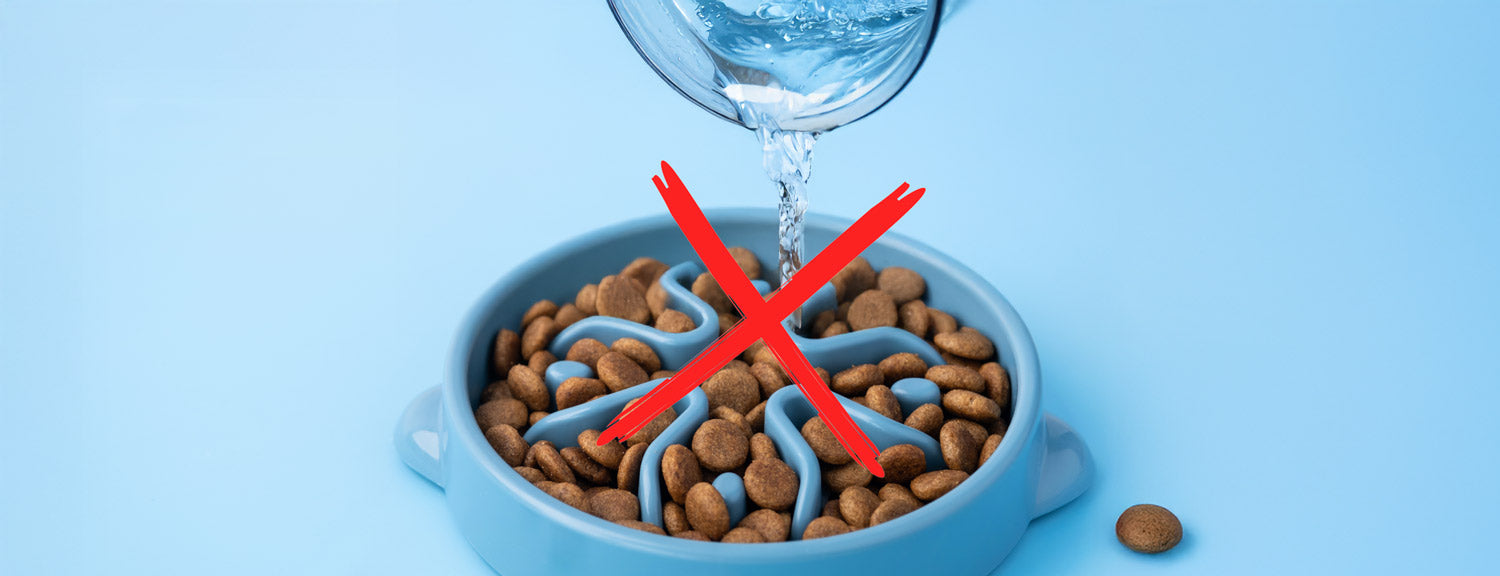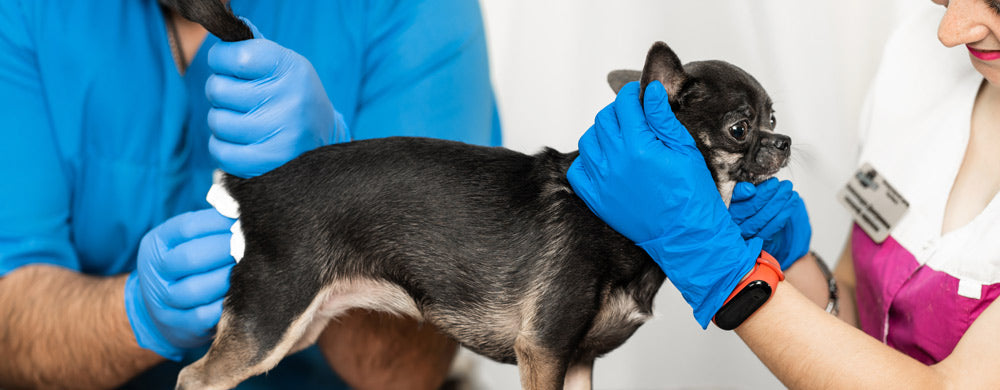Your basket is empty

Dog’s Upset Stomach? These Home Remedies Can Help
July 12, 2022 6 min read
All dogs get an upset stomach from time to time, and while our go-to treatments might be ginger beer, crackers, and dry toast, these aren’t suitable ways to soothe your pup’s tummy.
That’s why we’ll be going over some home remedies to help you treat your dog’s upset stomach and some of the most common causes of digestive issues in dogs to help you get your four-legged friend back on the mend.
***
Are Upset Stomachs Common in Dogs?
Most dogs will suffer from an upset stomach at some point in their lives. However, for some canines, especially if they have a sensitive gut or a tendency to eat things they’re not supposed to, upset stomachs can happen semi-regularly.
If your pooch frequently suffers from gastroenteritis, it could point to a problem with their gastrointestinal tract or be a sign of an underlying health condition.
***
Symptoms of an Upset Stomach
The tell-tale symptoms of an irritated stomach in dogs are diarrhoea and vomiting, but there are several other signs to look out for, including:
- Reduced or loss of appetite
- Depression
- Fatigue or lethargy
- Decreased thirst
- Frequent licking of the lips, air, objects, or surfaces
- Gulping (to combat acid reflux)
- Appearing uncomfortable or stretching frequently
Dogs experiencing nausea will often lick their lips, swallow excessively, drool, pace, and contract their stomach muscles. They may also eat grass outside to induce vomiting and settle their tummy.
***
What Causes an Upset Stomach in Dogs?
There are many causes of an upset stomach in dogs, such as:
- Sudden change in diet
- Eating rubbish or human food
- Food allergies or intolerances
- Canine parvovirus
- Intestinal parasites
- Bacterial gut infections
- Gut blockage
- Motion sickness
- Certain medications (such as dewormers)
- Inflammatory bowel disease
- Irritable bowel syndrome
- Stomach ulcers
- Stomach cancer
- Intestinal malabsorption
Bear in mind that this is not an exhaustive list. If your dog regularly suffers from diarrhoea and/or vomiting, especially if other abnormal symptoms accompany it, make sure you book an appointment with your vet as soon as possible.

Eating Rubbish or Human Food
Perhaps the most common cause of an irritated tummy in dogs is simply eating something they shouldn’t have, whether that’s rubbish found during a walk or some leftovers you accidentally dropped on the floor.
If this is the case, your dog’s vomiting and diarrhoea should pass within 24 to 48 hours. However, if your dog’s upset stomach persists or worsens after this time, don’t delay in getting them checked out by a vet.
Alternatively, if your dog displays symptoms like pale or blue gums, foaming at the mouth, seizures, or collapse, take them to see a vet immediately as they may have ingested something poisonous.
Food Allergies and Intolerances
Another common cause of digestive issues in dogs is food allergies. These occur when your pet’s immune system overreacts and creates antibodies to substances that are normally tolerated. A food allergy can cause symptoms like itchy skin, vomiting, chronic gas, and loose stools.
Food intolerances produce similar symptoms but do not cause an immune system response. For example, lactose intolerance occurs in dogs when their body is unable to process the lactose in dairy products.
Most food allergies happen after prolonged exposure to one brand or ingredient of food. This means your pooch can tolerate a specific brand or type of food for many months before suddenly becoming allergic to it.
Sudden Change In Diet
Switching your dog’s food too abruptly can cause gastrointestinal distress like loose stools, vomiting, gas, and a reduced appetite. That’s why you should always change your dog’s food over around 5 to 7 days, as this allows your pooch’s system to gradually adjust to the new food.
On the first couple of days of your dog’s diet change, add around 25% of new food to their old food, then increase that amount to 50% on days 3 and 4. The fifth and sixth days should be around 75% new food. Lastly, on day 7, feed your pet 100% of their new food.
Dogs with food allergies or sensitive tummies may need more time to adjust to a new diet, so you might want to extend the transition phase by an additional week.
***
Can Natural Remedies Help a Dog with an Upset Stomach?
It’s never nice when your dog is suffering from an upset stomach as, understandably, you want to do everything you can to get your companion back on track as quickly as possible. Fortunately, there are a few natural remedies you can try at home to ease your pooch’s symptoms and help them feel better.
Before we dive into these treatments, we just want to reiterate the importance of seeing a vet if your dog’s upset stomach persists after 48 hours or they have any other abnormal symptoms.
Although most cases of an irritated tummy can be dealt with at home, there’s always a possibility that your pet could have an underlying medical condition that is causing their GI distress.

Withhold Food for 12 to 24 Hours
After your dog has vomited or suffered from diarrhoea, it’s a good idea to remove food for 12 to 24 hours to give their gastrointestinal tract some time to recover. During this period, offer your dog small amounts of water or a couple of ice cubes to keep them hydrated.
The latter is a great way to introduce water to your pooch slowly to see if they can keep liquids down.
If your dog is a puppy, only fast them for 12 hours, then offer them bland foods like boiled chicken meat (boneless and skinless), white rice, pumpkin, and bone broth.
Offer Bland Foods
Most vets recommend giving dogs a bland diet after a period of sickness to prevent further irritation to the gastrointestinal tract. The most common food owners feed their dogs after vomiting and/or diarrhoea is boiled (skinless and boneless) chicken breast with boiled white rice as these are both gentle on the digestive system.
If you don’t have any chicken or white rice on hand, some other bland foods you can try are plain boiled turkey, white fish, or rabbit, as well as 100% tinned pumpkin and boiled sweet potatoes. Don’t add any seasoning, spices, or oils to your dog’s meal as this could aggravate their condition.
Alternatively, if your pet tolerates dairy, low-fat cottage cheese and boiled eggs are also good options.
Add Prebiotics or Probiotics to Your Dog’s Diet
Once your pooch’s GI tract has had a chance to recover and they’re back on the mend, prebiotics and probiotics can be a great way to keep your pet’s digestive system healthy.
Probiotics are friendly microorganisms that live in your dog’s digestive tract that help them digest food, fight off infections, create vitamins and nutrients, and strengthen their immune system.
Prebiotics act as vital fuel for probiotics to increase their effectiveness. Both prebiotics and probiotics are advantageous for dogs with an upset stomach or those that suffer from digestive issues as they top up your pooch’s natural gut flora, while also reducing the effects of diarrhoea, inflammation, and gas.
If you’re looking to add a supplement to ease your pooch’s tummy and boost their digestive health, check out TUMMY, our 100% natural prebiotic and probiotic supplement for dogs and puppies.
It contains digestive enzymes, prebiotics, and a 5-strain probiotic blend of healthy bacteria that all work to support your pooch’s gut and improve digestion function, which is beneficial for dogs with sensitive tums or those who are recovering from an illness.
Another natural product to always have in your dog supplies cupboard is GUTSY, our natural tummy suspension for old and young canines. Dogs always seem to get a bout of diarrhoea at the worst times, whether it’s when you’re moving house or having a new carpet installed.
GUTSY is the perfect solution as it contains Montmorillonite and Attapulgite clays, both of which work quickly to control diarrhoea and soothe your pet’s digestive tract. In fact, you’ll often see an improvement after just one use of GUTSY, so you and your pooch can get back on schedule without too much fuss (and mess!).
As always, speak to your vet before you add any supplements to your dog’s diet to make sure they’re the right choice for your pet.
***
Should I See a Vet?
If your dog’s upset stomach lasts for more than 48 hours or they frequently suffer from diarrhoea, vomiting, gas, and other symptoms of GI distress, it’s best to get your companion seen by a vet straight away.
Warning signs to look out for include:
- Fever
- Continual diarrhoea
- Continual vomiting
- Drooling uncontrollably
- Lethargy
- Bloated or distended stomach
- Blood in stool or vomit
- Retching with no vomit
- Dehydration
- Weakness or collapse
- Seizures
- Foreign object or toy in vomit/stool
- Increasing discomfort
The above symptoms can be signs of something a lot more serious than an upset stomach, such as stomach bloating, internal parasites, pancreatitis, intestinal blockage, poisoning, or a severe allergic reaction.
***
Final Thoughts
Bland foods, fasting, rest, and prebiotic and probiotic supplements like TUMMY, and natural tummy suspensions such as GUTSY can all help your dog on the road to recovery after suffering from an upset stomach.
If you’re worried about your pooch at any point or their symptoms worsen, don’t hesitate to book an appointment with your vet so they can investigate further.
Also in Pet Advice

Should You Add Water to Your Dog’s Kibble? Here’s What the Science Says
August 14, 2025 7 min read
Should you add water to your dog’s kibble? Discover the science-backed pros, cons, and better alternatives like bone broth and fresh food to improve hydration, digestion, and overall canine health...

DIY Frozen Dog Treats Your Pup Will Love
June 27, 2025 4 min read
Summer heat can be dangerous for dogs, making hydration more important than ever. Learn how to spot signs of dehydration, boost your pup’s water intake, and create fun, frozen recipes to keep them happy and healthy all season long.

Why Is My Dog Scooting? Common Causes and How Diet Can Help
May 09, 2025 4 min read
If your dog is scooting or smells fishy, it could be due to blocked or irritated anal glands. Learn what causes blocked anal glands, which dogs are most at risk, and how simple dietary changes—like adding fibre and anti-inflammatory nutrients—can help prevent recurring problems.


